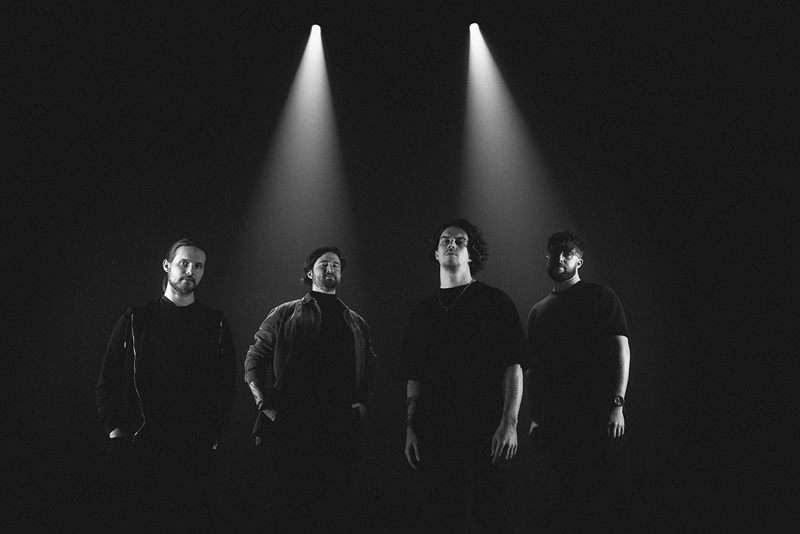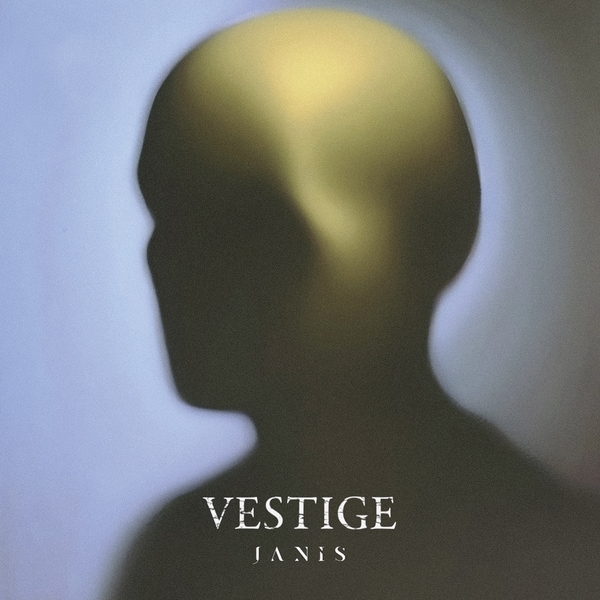 Can you describe how your experiences in Naraka influenced the development of VESTIGE’s sound and the direction of Janis?
Can you describe how your experiences in Naraka influenced the development of VESTIGE’s sound and the direction of Janis?
First thing to know is that I’ve never been any creative engine in Naraka. I was only the session singer of the band for the recordings, and for live shows. JP, guitarist of the band gets all the credits for all the creative part of Naraka. Regarding Janis, my creation phase took place when I was alone at home, feeling I had few things to express. To go further concerning Naraka, I have express with much gratitude that this is the band that allowed me to grow as a singer, feeling confident and happy on stage. It also allowed me to meet wonderful human beings who follow me nowadays in Vestige. I’m truly grateful to JP and Naraka for this.
What role did collaboration play in shaping the sound of Janis? Were there any unexpected contributions from your bandmates that significantly impacted the album?
As I briefly started to develop in the answer above, I started this process of creation alone, in some kind of an exacerbated loneliness feeling. It’s been a vital, personal and introspective journey from start to finish. My musicians and friends joined me in the end of that process to add each of their own soul with their instruments, feelings and with their own view of what I had created. I truly appreciated and still do, that they take part of the creation process this way.
What probably had the biggest impact on Janis in our collaboration is that they were extremely supportive, understanding, and convinced about what they got to hear from me, and the whole spirit of the band, leading all of us as deep as possible to the path I started on my own.
In the creation of Janis, was there a specific track or moment that marked a turning point in your creative process? How did it influence the rest of the album?
The way I composed this record was pretty “raw” since I felt I needed to pull out some strong feelings from myself. Thus, it has been quickly written with a special pattern in which most of the songs were 70 to 80% composed within a single day. One big key moment I remember was actually the first riff I had alone at home, at 4am: Envol de l’Âme intro. I understood at this precise moment that I had to go further and start creating more. This one was by the way the first song I started to write, and the last one I finished on the album.
How did the emotional and thematic content of Janis evolve from your initial ideas to the final product? What were the key moments of transformation?
I’d say it evolved exactly as I was evolving on this period. Janis is clearly about mental health struggles, but before feeling better in those tough moments, you must accept. Figuring out why you’re not doing good, and what’s the next step to start healing?
I feel like I wasn’t really 100% conscious of the themes I was about to explore, and it became clearer and clearer by the time I was going further in this creating process. Janis acted more like a solution to me than as a piece I was consciously creating.
The moment I was finally aware of what I was going through happened when I got finished with Envol de l’Âme, which was the last song I finished. This song is more optimistic than the ones I wrote before, but I didn’t really know how to conclude it. When I finished the song with this violent breakdown in the end, I was finally living the moment I really realized what Janis was actually about, and how benefic it was to me.
How did you decide on the album’s title, Janis, and how does it relate to the overall concept and themes of the album?
I decided to name the record Janis for few reasons. One of them was to pay homage to Janis Joplin, who took her life because of depression. I also wanted to combine two things: the name of a woman because I felt like I was talking to the love of my life I had to break up with, during this writing process. It personified the record this way to me. And I wanted to combine this symbol with another layer of reading: the theme of mental health struggle and depression, to express that sometimes you have to break up with yourself to move further and heal from something you’ve been suffering somehow. Last reason is that I also wanted to pay a homage to “Grace” from Jeff Buckley, who has been a huge inspiration for me. He named this album with a woman name, and so did I.
https://www.youtube.com/watch?v=-fJjk6kUTIg
What’s a specific lyrical theme or concept in Janis that you feel is central to the album’s message? What inspired this theme?
As mentioned above, my main point was to be able to express this double layer of reading as efficiently as possible. At first you can feel like I’m talking to the soul sister I lost somehow, whereas you can also understand that I’m talking to myself as well. Each song and sentence in the lyrics have been written in a particular order allowing you to understand this journey through realization. As a cathartic journey.
How are you preparing for the release of Janis in terms of promotion and connecting with your audience? What are your expectations and hopes?
We’re working hard with our beloved label which is the ideal partner to represent us. We’re also extremely careful on the way we communicate, on band’s image, on what we post, what we show, what we try to keep a bit blurry, to make sure we send exactly the image we want people to feel while listening to our music.
And of course, we truly want to connect with people during live shows, being able to transfer this raw, sad, and powerful energy we feel while playing our songs live. Regarding our expectations and hopes, we do not want to set any limits, we want the band to reach as much people as possible, our music to reach as many ears as possible, and we can’t wait to see what will follow.
What do you consider the biggest risk or experiment you undertook in Janis, and how do you feel it paid off in the context of the album?
I wouldn’t say any artistic risk has really been undertaken in Janis. I just dropped what I felt, what I felt like doing, I didn’t set any limit in my musical influences, I didn’t take time to think about this, I just composed and wrote without thinking. Maybe this is a detail people can feel, and it may help us in a way! Vestige is a medley of many intertwined different genres of music. I didn’t think about how quite old school black metal would fit with modern djent vibes; I just did my thing. I didn’t wonder if it was going to be well received or not, it didn’t matter. It seems hard to me do something people will like if you don’t like this yourself first.
Can you share an example of how a particular song or idea evolved over time during the album’s creation? What were some key moments in its development?
I’d say that the song that fits the most to this question would be the last one of the record: Avant la Fin. This one was really the end of this cathartic path and put way more time to emerge. This is by the way why I end up this song with “Le Silence me prit de court (Silence took me by surprise)”, meaning that we’re getting on the last step of this journey, which ends up with a long instrumental section.
What’s one detail or aspect of Janis that you think might not be immediately obvious to listeners but holds significant meaning or importance to you as a band?
I think Janis’ strength is that it feels 100% honest right at first listen, and that it keeps giving you more and more details you haven’t heard before, even after listening many times. The most important aspect to me in Janis is that I hope the way I composed it, with violent parts and more aerial parts, will keep people attention from start to finish. For example, mosh parts haven’t been placed here and there just to be able to say we are a metal band. They’ve been thought to serve the message I want to pass and keep the narration logical.
Looking back at the creation of Janis, is there anything you wish you had approached differently, or any aspect of the album that you feel particularly proud of?
Regarding the creative part, I wouldn’t change anything because this process is literally the reason this project took life. What I would probably like to change would be the production part of the record. But it was our first album, we didn’t have any label at this time and did this with what we had, like most amateur bands do when they start from nothing.
The aspect of the record I’m particularly proud of is that I feel I’ve managed to pass the message I needed to pass, through an artistic way, with music, lyrics, feelings… I’m pretty proud also of the artistic identity we’ve been setting up throughout the whole process of creating, recording, producing, and promoting the album. I hope people will be touched by our music, and that they’ll enjoy it as much as it healed me to create it.
https://linktr.ee/vestigemusic
If you really would like to support Antichrist, you can just Share our article.
You can also support Antichrist by sending a couple bucks to cover some webhosting expenses. =>> PayPal




